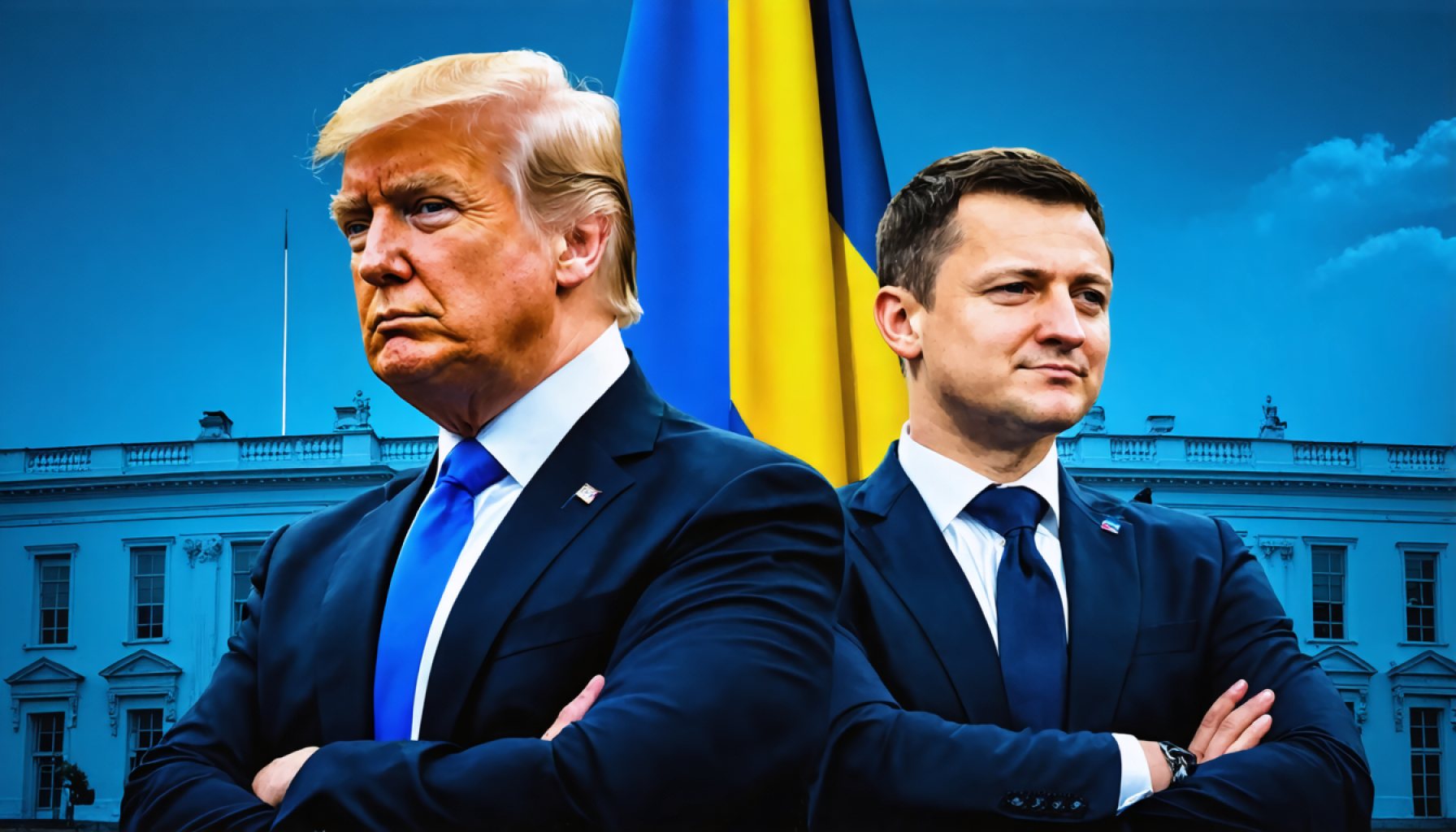- Tensions escalate between Donald Trump and Volodymyr Zelensky, as Trump criticizes Zelensky’s choice to implement martial law and halt elections amid the Russian invasion.
- Trump accuses Zelensky of exploiting U.S. aid under President Biden, intensifying the narrative of corruption and frustration.
- Zelensky counters Trump’s claims, accusing him of spreading disinformation, exacerbating the diplomatic rift.
- Exclusion of Zelensky from key talks in Saudi Arabia further fuels the discord between the leaders.
- The clash raises questions about the future of U.S. diplomacy in the region and its ability to broker peace.
- The unfolding situation could significantly impact transatlantic relationships, requiring careful diplomatic navigation.
An icy chill swept through the diplomatic corridors as President Donald Trump’s relationship with Ukrainian leader Volodymyr Zelensky continued to unravel. This week, Trump’s pointed social media rebuke against Zelensky labeled him a “dictator without elections,” suggesting that the United States had been coerced into an unwinnable war.
Trump’s salvo added fuel to a smoldering fire, echoing sentiments shared by Russia, where Zelensky’s martial law decision during Russia’s invasion stirred controversy. The Ukrainian leader’s actions halted scheduled elections, complicating the democratic narrative just as much as the conflict on the ground.
As Trump wove his criticisms of President Biden with his skepticism of Zelensky, he painted a picture of corruption and frustration. He alleged that the Ukrainian leader was riding a “gravy train” of U.S. aid under Biden’s watch. His rhetoric at a Miami event intensified the offensive, warning that Zelensky needed to move quickly or risk losing his country.
Amid the charged atmosphere, Trump aides bristled at Zelensky’s criticism, especially when he accused Trump of living in a “web of disinformation.” The tension had built long before, but a tipping point arrived when Zelensky was excluded from talks with Russian officials in Saudi Arabia—a move that incensed Trump.
As the diplomatic saga unfolds, questions linger about whether these barbs will extinguish any hopes for a U.S.-brokered peace or forge a new path. For Zelensky, the end game Trump envisions seems aligned with Russian ambitions, leaving the Ukrainian leader no choice but to speak out.
The unfolding rift could redefine relationships on both sides of the Atlantic, hinting at a diplomatic dance where every step must be carefully choreographed or risk spiraling out of control.
The High-Stakes Diplomatic Dance: Will Trump’s Criticisms of Zelensky Reshape Global Politics?
### How-To Steps & Life Hacks for Diplomacy in Conflict Zones
1. **Understand Local Context:** When engaging in diplomacy, especially in conflict zones, it is crucial to have a deep understanding of the local political landscape and historical ties.
2. **Communication Channels:** Establish multiple communication channels to ensure messages are delivered clearly and quickly corrected if misinterpreted.
3. **Cultural Sensitivity:** Be mindful of cultural differences that might affect negotiations. Training in intercultural communication can decrease misunderstandings.
### Real-World Use Cases: Diplomatic Tension Management
The current tension between Trump and Zelensky illustrates the complexities involved in international diplomacy where personal relationships and public perception can sway negotiations. Countries like India and China have previously navigated similar diplomatic tightropes, balancing public statements with diplomatic gestures.
### Market Forecasts & Industry Trends
The geopolitical uncertainty caused by such diplomatic tensions can influence global markets. Analysts predict increased volatility in energy and defense markets as these sectors respond to shifting alliances and security concerns.
### Reviews & Comparisons: Leaders’ Diplomatic Styles
– **Donald Trump:** Known for his untraditional diplomatic approach, often using social media platforms to communicate directly with world leaders.
– **Volodymyr Zelensky:** Initially came into power with a pro-reform agenda, carrying the expectation of Western alignment.
Comparing these styles, experts often cite Trump’s unpredictability as a double-edged sword, whereas Zelensky’s Western overtures face ongoing challenges due to his domestic decisions during the conflict.
### Controversies & Limitations
The main controversy stems from Zelensky’s suspension of elections, a move criticized by Trump as anti-democratic, yet seen by others as necessary due to the invasion by Russia. This highlights the limitation of democratic ideals during wartime.
### Features, Specs & Pricing of Diplomatic Solutions
1. **Multilateral Conferences:** These solutions can be costly and time-intensive but provide a platform for collective dialogue, such as the model seen in the U.N. General Assembly.
2. **Backchannel Negotiations:** Often more discreet and cost-effective, allowing for flexible, off-the-record discussions.
### Security & Sustainability of Diplomatic Relations
Building sustainable diplomatic relations requires ongoing engagement and trust-building measures. Security partnerships, like NATO, depend on mutual interests and common defense strategies against external threats.
### Insights & Predictions
As tensions continue, it’s likely that the diplomatic strategies employed will tilt towards involving neutral mediators. Countries like Sweden and Switzerland may be tapped due to their history of neutrality.
### Tutorials & Compatibility in Diplomacy Tools
Modern diplomatic engagements rely heavily on technology:
– **Digital Security:** Ensure secure digital communication tools like encrypted messaging platforms are in place.
– **Foreign Policy Alignment Tools:** Platforms for simulating potential policy impacts, enhancing decision-making compatibility.
### Pros & Cons Overview
**Pros:**
– Direct critique could pressure accountability and reform in allied governments.
– Transparent engagements may strengthen democratic debates on foreign policy.
**Cons:**
– Risks alienating allies which could weaken strategic coalitions.
– Increases room for adversarial propaganda.
### Actionable Recommendations
– **Stay Informed:** Regularly update your knowledge about global political developments using credible news sources.
– **Engage in Dialogue:** Foster open discussions within your community to spread awareness about international policies.
– **Support Humanitarian Efforts:** Contribute to organizations providing aid in conflict zones, as diplomacy is often paired with humanitarian gestures.
For more insights on global politics, visit Reuters or BBC for trusted international news coverage.



